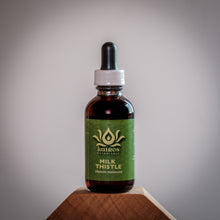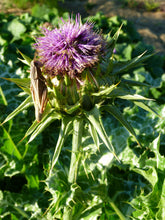Native to the Mediterranean, North Africa and the Middle East, the seeds of the Milk Thistle have been used for 2000 years to treat chronic liver disease and protect the liver against toxins.
Made with fresh ground seed.
Bottle: 50ml
-----------------------------------
Would you like to know more? Below you can find an excerpt from our book "Medicinal Herbs to Know and Grow"
An annual or overwintering annual, native to the Mediterranean and now widely naturalized across the planet, milk thistle is a striking plant growing from 3 to 7 feet tall with large smooth, glossy green leaves edged with sharp spines and painted with veins of creamy white. According to tradition, these veins originated from the milk of the Virgin Mary falling upon a plant, hence the plants alternate names Mary Thistle, or Saint Mary's Thistle. It bears beautiful bee-loving, solitary, bright purple flower heads, which give rise to the brown-black seeds.
The plant prefers moist, rich calcareous soil with full sun, but will tolerate part shade. Because milk thistle is a tap-rooted plant, it does not take to transplanting and does poorly in pots. It is best sown directly in the soil either in the early spring for a late summer harvest or in late summer, allowing the rosettes to overwinter (they’re hardy to 5°F) and harvesting the ripe seed the following summer.
Don’t plant too densely as it will be a painful process when harvesting the seed. Gloves are recommended! First cut off the partially dried seed head prior to it fully opening, collect in a bin, and dry down further in the sun for several days. Then thresh the seed head until it’s fully broken apart, screen and winnow until you’re left with just the beautiful milk thistle seed. Alternately, you can pluck the seeds from the ripe heads if you are very careful.
The leaves contain silymarin, the active ingredient also found in the seeds, and are edible and tasty. First remove the prickly spines by carefully peeling or cutting off the outer edge and add to salads or steam.
Milk thistle seeds have long been known for their powerful regenerative effect on the liver. They are used internally in the treatment of liver and gall bladder diseases, jaundice, cirrhosis, hepatitis, cancer, and mushroom poisoning from various mushrooms including Death Cap. The seeds are also known to have antioxidant, antiviral and anti-inflammatory properties.
A friend of ours with liver cancer was given less than 2 weeks to live when he started chewing our milk thistle seeds regularly and he enjoyed 6 more months with his family.
Roasted milk thistle seeds can be used as a coffee substitute and milk thistle roots can also be utilized, being eaten roasted or boiled and buttered.






